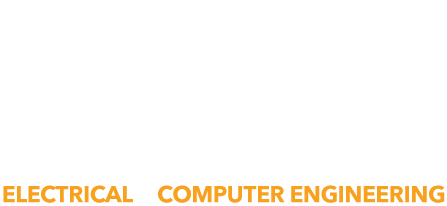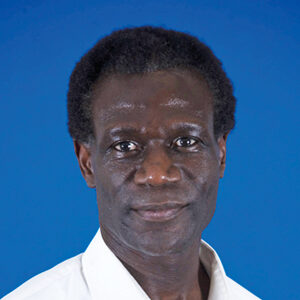Eric Donkor (Ph.D. ’89 ENG) Retires from 35-Year Career in ECE
When Eric Donkor began his career at UConn in the late 80s, fiber-optic communication networks operated at speeds ranging from 1 to 10 megabits per second (Mbps). With advancement in fiber optics and fiber lasers, data transfers leaped to 10,000 Mbps by the mid 2000s and 100,000 Mbps by 2010.
While speeds have continued to rise to almost 800,000 Mbps in recent years, Donkor focuses his primary research on the design and development of fiber optics and opto-electronic devices for high-speed optical networks. These range from 40,000 Mbps to 100,000 Mbps and are ideal for transmitting information through laser light and fiber optic cables. Signal loss is minimal, making them ideal and reliable for electronic communications and medical, mechanical, military, automobile, and aerospace applications.
“As a result, today’s internet providers are installing fibers to the home, thereby providing high-speed large bandwidth fiber communication networks to remote and rural towns all across the U.S.,” he explained. “We never would have seen this 35 years ago.”
Donkor, who retired in August after spending his entire career at UConn, is founder of ECE’s High Speed Optical Network and Device Lab. There, he also researched terahertz optical frequency comb generation, optical analog-to-digital conversion, and the investigation of high-speed switching in fiber optics. His most current research, supported by the Air Force Research Laboratory (AFRL), centered on the application of nano-photonics for optical nano-circuits design, and quantum photonics for secure communication over fiber optics.
ALL ABOUT GOOD TIMING
After receiving his bachelor’s degree from the University of Cape Coast in Ghana, West Africa, Donkor came to the United States and pursued a master’s degree in electrical engineering from Boston University and a Ph.D. in electrical engineering at UConn.
In the summer of 1988 as he was finishing his Ph.D. at UConn, the late Professor of Electrical Engineering Clarence Schultz retired. This left a teaching vacancy for the senior design lab course, which is required for all seniors in electrical engineering.
Donkor, who was the teaching assistant for that course and became adept in teaching the course during his Ph.D. program, was approached by ECE Professor Faquir Jain, then head of the EE Department, with an invitation to be hired as a lecturer to teach the Senior Design Laboratory in the interim. While the opportunity sounded enticing, Donkor already had two other job offers at other universities.
“Coincidentally, the EE Department had an open search to hire for the vacant position following Professor Schulz’s retirement,” Donkor recalls.” When I was made aware of this, I considered the opportunity and decided to apply for the position. And I was hired in January 1989.”
Six years later, Donkor was promoted to associate professor, and has retained this position for the past 28 years.
“Dr. Donkor filled a niche in our curriculum, offering courses in the area of nanophotonics and fiber optics,” Jain says. “When fiber optic communication was expanding, he established his lab so undergraduates could have hands-on experience, and later, he oversaw a well-equipped laser laboratory for graduate research. In addition, Dr. Donkor was instrumental in strengthening nanoscience minor in ECE and was always ready to serve as an advisor.”
TEACHINGS
During his tenure, Donkor taught more than a dozen electrical engineering undergraduate and graduate courses including Digital Systems, Nonlinear Optical Devices, Electronic Devices and Circuits, Advanced Semiconductor Devices, Analog Design Laboratory, Micro/Opto-electronic Devices and nanophotonics. He designed and has been teaching the current offering of Optical Engineering lecture and Optical Engineering Laboratory courses for almost a decade.
He also teamed with David Jordan, professor of electrical engineering (EE) emeritus and former department head, and Bob Northrop, professor of electrical engineering and biomedical engineering emeritus, to design the Senior Design Course as offered in its current format where “In the first semester, students practice technical writing, and oral presentations skills among others. They form design teams and each team is assigned a design project, as well as faculty advisor,” Donkor explains. “The second semester is dedicated to the design, implementation and completion of the project. The course ends with presentation by students, and a show and tell of the final project.”
In 2000, for his teaching efforts, Donkor received the School of Engineering’s “Outstanding Teaching Faculty” award, and “Excellence in Teaching” award from the Electrical and Computer Engineering Department.
STAYING ACTIVE
Outside the lab and classroom, Donkor took membership in the Society of Photo-Optical Instrumentation Engineers (SPIE) as a Fellow; Connecticut Academy of Science and Engineering (CASE); Institute of Electrical and Electronic Engineers (IEEE) as Senior Member; and Life Time Member of the scientific honor society Sigma Xi. In addition, he served as an associate editor of Optical Engineering and an editorial board member for the Journal of Nanoscience and Nanotechnology, and most recently as secretary of the Connecticut Academy of Science and Engineering (2020 to 2024) and program chair of the SPIE Quantum Information and Computation Symposium (1999 to 2024).
At UConn, he served as chair of the University Interdisciplinary Courses Committee (UICC); secretary of the formerly named School of Engineering; member of the University Senate; chair of the ECE Department’s Curriculum and Courses Committee; and member of UConn’s Information Technology Building (ITE) building plan committee.
“I stay involved in so many organizations for three basic reasons,” he says. “For one, I like to be on top of developing and emerging trends in my field of the technology. And also, I enjoy networking with other researchers and serving in professional societies.”
WORDS OF WISDOM
As Donkor heads into retirement, he shares a word of advice for students considering the ECE major: network with ECE’s faculty.
“Students should be proactive to tap into the wide range of experience and expertise of the faculty they come in contact with,” he says. “I know many faculty members will be very open to mentoring students to facilitate a smooth and successful climb up the professional ladders. For one, all faculty ‘have been there, done that’ at all stages of academic learning. Therefore, they provide a wealth of information, help, and insights for thick and thin times as a student mazes through academic and professional pathways.”
By Olivia Drake
Categories: News
Published: July 24, 2024
Available Archives


